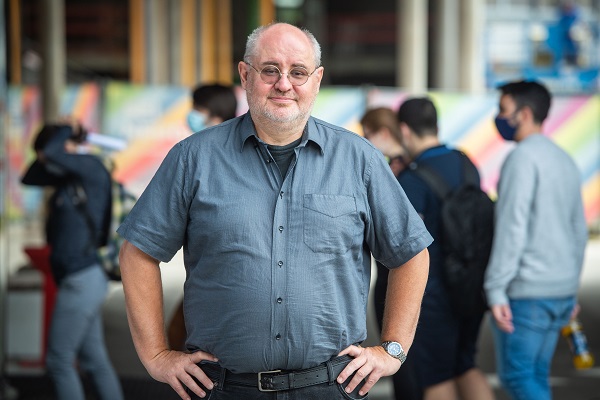The TN Faculty is pleased to welcome ten new professors to the JKU. Today we spoke with Johannes Fürnkranz.

Prof. Johannes Fürnkranz has been teaching and conducting research at the Institute for Application-Oriented Knowledge Processing since October 2019. Here he talks about AI and what to be careful of and why, when it comes his students, he considers himself more of an educator than an examiner.
Mr. Fürnkranz, what is your area of research?
Johannes Fürnkranz: My research focuses on machine learning and data mining. Deep neural networks - on account of their outstanding classification performance in many areas – currently dominate research; I focus on learning in formal description languages. It is a learned concept - which can be formulated into the form of logical if-then rules – and is often easier to interpret than a non-transparent neural network. This can also create more confidence in machine-generated suggestions.
What do you find particularly fascinating about this area?
Johannes Fürnkranz: Learning itself is a core skill both naturally and in regard to artificial intelligence. I have been interested in exploring ways to formalize learning and education since I was a student, especially as this is at the crossroads of computer science and psychology. Machine learning, however, has very little to do with the way humans learn. It’s mostly about automatically recognizing patterns and consistencies in large amounts of data, something that humans don’t really care to do. Conversely, machines do not come close to humans in that they cannot learn from their experiences. That’s what distinguishes us humans.
Why is this research even necessary, meaning how will it improve our lives?
Johannes Fürnkranz: Like many other technologies, artificial intelligence has great potential to improve our environment. We have to, however, be careful and make sure that recommendations for these kinds of systems are always justifiable and transparent, and that inexplicable decisions are not made based solely on computer recommendations (as in the "Computer says no..." sketches in the "Little Britain" series). By introducing the General Data Protection Regulation (GPDR), the EU has already taken steps in this direction. Research in the field of Explainable AI will help effectuate the progress needed in this area.
Why should students take your classes?
Johannes Fürnkranz: I often ask myself how I, back then as a student, would have thought about myself as a university instructor. I don't know if I would have been happy with myself. I probably don't spark as much enthusiasm for the topics I cover as I would like to. However, I hope I can at least convey to students that I take them seriously, that I am always there to talk about what they want and need, and that I will provide as much support as I can during their studies. In any case, I enjoy my role as an educator much more than that of an examiner.
What are you currently working on?
Johannes Fürnkranz: I believe the biggest challenge in my field is transferring deep structure learning (successful for neural networks), to learning in logic. The main issue is that the resulting discrete optimization problems are more difficult to deal with than numerical optimization methods, which can now be used quite efficiently to support numerical learning processes. Besides that, I am also very interested in using machine learning methods for gaming. Systems such as AlphaZero for chess and Go have played a key role in deep-learning breakthroughs. Again, I am primarily interested in finding comprehensible reasons for suggested moves. That will be the subject of my next project.
What are your hobbies?
Johannes Fürnkranz: I love to read and not just technical books. Unfortunately, due to time constraints, I haven’t been able to read as much as I would like to for a while now. The pile of unread books at home is getting higher and higher. On the other hand, I enjoy playing play chess and I can take short breaks to play “blitz chess” against online opponents. On the weekends, I enjoy long walks with my family and our dog.
What else do you want to do or achieve in your life?
Johannes Fürnkranz: Career-wise, I would like to help bring about the fact that machine learning in logic will be as successful as deep neural learning. In my opinion, the potential is there, but we need some groundbreaking discoveries.
Personally, there are some things I find interesting if I could spend more time on them, such as perhaps trying to write a novel?








